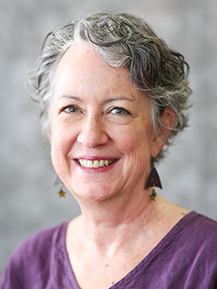Deborah Seltzer-Kelly
Associate Professor of Educational Studies, Dept Chair
CONTACT:
Forest Hall 203
765-361-6315
seltzerd@wabash.edu

Dr. Seltzer-Kelly came to Wabash College in the fall of 2012 after four years at Southern Illinois University, Carbondale. She has also taught U.S. and world history, speech and debate, and theater at the secondary level, and coached the national championship speech and debate team at the University of Nevada, Reno. Dr. Seltzer-Kelly and her husband live in Crawfordsville in an older home, so have added home improvement to their hobbies, along with travel, cooking, caring for their dogs and cats, and growing orchids.
Dr. Seltzer-Kelly’s research interests include: diversity and multiculturalism in the classroom; epistemologies of teaching and learning; and the methodological aspects and implications of research approaches commonly used in education. She is particularly interested in working with students on their own research, and also enjoys working with students as her research collaborators and co-authors.
RECENT COURSE OFFERINGS
EDU201 Philosophy of Education
EDU302 Diversity and Multicultural Education in High School Curriculum and Instruction
EDU330 Studies in Urban Education
EDU370 Special Topics: A seminar focused upon philosophical and/or historical issues in education, including areas such as colonial and postcolonial systems of education; comparative studies in educational systems internationally; education policy, etc.
EDU404 Teaching of Social Studies (Educational Studies minors only)
EDU423 Student Teaching Practicum (Education Studies minors in the licensure program only)
RECENT PUBLICATIONS
Seltzer-Kelly, D. (2014). Deweyan aesthetics for connection, continuity, and liberation. In C. Mayo (Ed.), Philosophy of Education Yearbook 2013. Urbana, IL: Philosophy of Education Society. http://ojs.ed.uiuc.edu/index.php/pes/article/view/4041/1353
Hernandez, A. & Seltzer-Kelly, D. (2014). Culture, education, and difference: Negotiating a pedagogy of shared experience. Hybrid Pedagogy. http://www.hybridpedagogy.com/journal/critical-pedagogy/culture-education-difference-negotiating-pedagogy-shared-experience/
Goura, T. & Seltzer-Kelly, D. (2013). Decolonizing vocational education in Togo: Postcolonial, Deweyan, and feminist considerations. Education & Culture 29(1), 46-63.
Seltzer-Kelly, D. (2013). Feynman diagrams, problem spaces, and the Kuhnian revolution to come in teacher education. Educational Theory 63(2), 133-149.
Seltzer-Kelly, D., Westwood, S.J., & Peña-Guzman, D. (2012). A methodological self-study of quantitizing: Negotiating meaning and revealing multiplicity. Journal of Mixed Methods Research 6(4), 258 – 274.
Seltzer-Kelly, D. (2012). Reconsidering the rhetoric of engagement: I and Thou in the classroom. In J. Portelli & B. McMahon (Eds.), Student engagement in urban schools: Beyond neoliberal discourses. Charlotte, NC: Information Age Publishing.
Seltzer-Kelly, D., Cinnamon, S., Cunningham, C.A., Gurland, S.T., Jones, K., & Lindsay Toth, S. (2011). (Re)Imagining teacher preparation for conjoint democratic inquiry in complex classroom ecologies. Complicity 8(1), 5-27.
Seltzer-Kelly, D., Peña-Guzman, D. & Westwood, S.J. (2010). Deweyan multicultural democracy, Rortian Solidarity, and the popular arts: Krumping into presence. Studies in Philosophy and Education 29(5), 441-457.
Seltzer-Kelly, D. (2009). Adventures in critical pedagogy: A lesson in U.S. history. Teacher Education Quarterly 36(1), 149-162.
Seltzer-Kelly, D. (2008). Deweyan Darwinism for the 21st century: Toward an educational method for critical democratic engagement in the era of the Institute of Education Sciences. Educational Theory 58(3), 289-304.
Robinson, M., Tibanyendera, B. & Seltzer-Kelly, D. (2007). Knowledge and attitudes of Ugandan preservice science and mathematics teachers toward global and Ugandan science and technology based problems/threats. Bulletin of Science, Technology & Society 27(2), 142-153.
MAJORS & MINORS
AT WABASH
- Accounting (pipeline)
- Art
- Asian Studies (minor)
- Biochemistry
- Biology
- Black Studies (minor)
- Business (minor)
- Chemistry
- Classics
- Computer Science
- Economics
- Education Studies (minor)
- Engineering (dual-degree)
- English
- Environmental Studies (minor)
- Financial Economics
- Film and Digital Media (minor)
- French
- Gender Studies (minor)
- German
- Global Health (minor)
- Greek
- Hispanic Studies
- History
- Humanities
- Latin
- Law (pre-professional)
- Mathematics
- Medicine (pre-professional)
- Modern Languages
- Music
- Neuroscience (minor)
- Philosophy, Politics, and Economics
- Philosophy
- Physics
- Political Science
- Psychology
- Religion
- Rhetoric
- Spanish
- Theater
